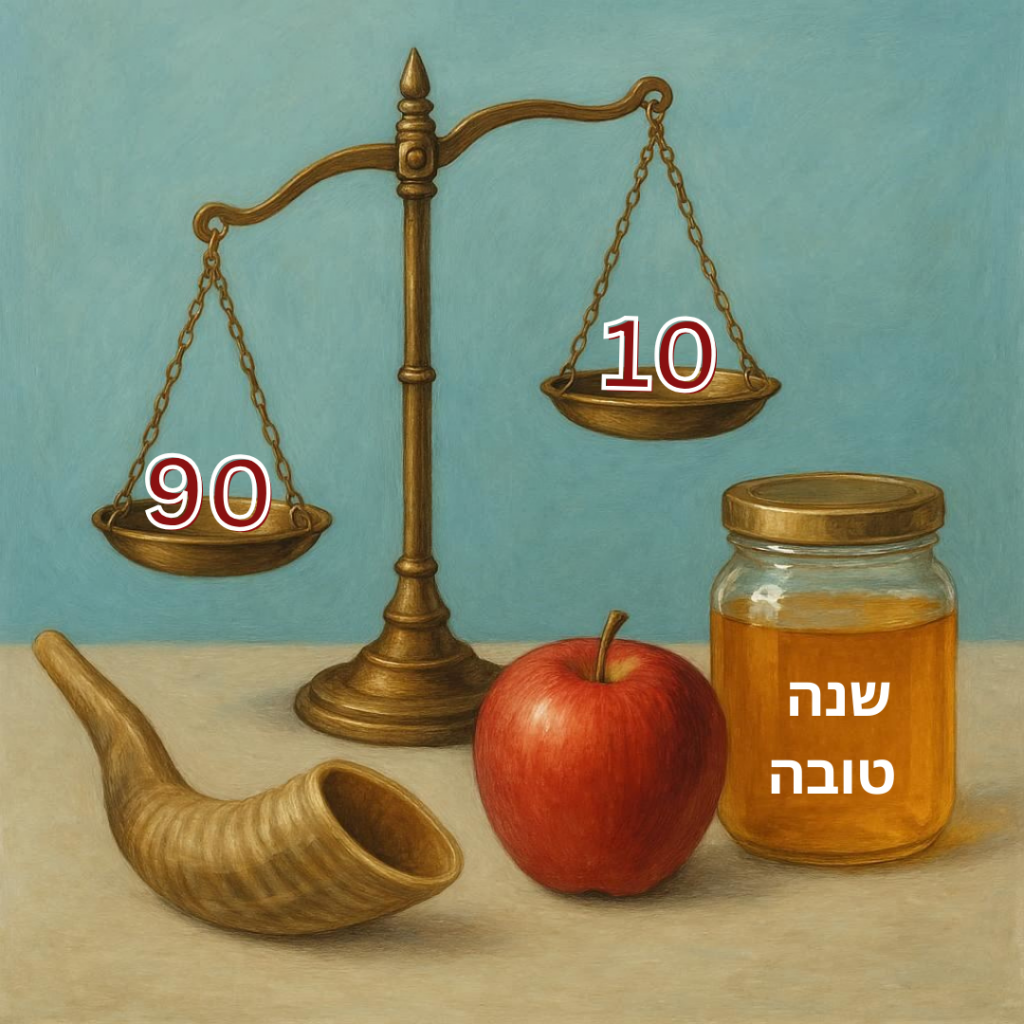Transforming The High Holiday's Anxiety to Joy - Elul Growth

Many of my clients struggle with Elul and the Yamim Noraim (High Holy Days), especially when fear-based teachings have shaped their experience of these days. This often blocks true Elul growth and creates anxiety instead of connection. They were raised to be afraid of Hashem, worried about punishment, and distant from the loving relationship Yiddishkeit (Judaism) offers. This fear-based approach builds barriers rather than bridges to spiritual and emotional healing.
For this reason, I have put together the sources for the approach to serving Hashem out of love, exploring a more balanced approach to our relationship with Hashem – one based on awe (‘יראת ה) rather than paralyzing fear (פחד), and ultimately rooted in love (‘אהבת ה).
For those struggling with religious anxiety, guilt, or feeling distant from their spirituality, this perspective can be transformational in creating the joyful, close relationship that Hashem truly desires with each of us.
Let’s delve in and discover real Elul Growth and how to have a meaningful Yamim Noraim…..
What Hashem Really Wants: The Foundation of Elul Growth
‘ה (God) wants us to draw close to Him – to form a strong, loving connection and feel His loving-kindness as stated in Devorim 11:13.
Hashem wants us to be happy
תַּחַת אֲשֶׁר לֹא־עָבַדְתָּ אֶת־ה’ אֱלֹקֶיךָ בְּשִׂמְחָה וּבְטוּב לֵבָב מֵרֹב כֹּל (דברים כח:מז)
Because you did not serve Hashem your G-D amid gladness and goodness of heart from an abundance of all (Devarim 28:47)
Dovid Hamelech writes עבדו את ה’ בשמחה באו לפניו ברננה
Serve Hashem with gladness come before him with joyous song (Tehillim 100:2)
And throughout the Psalms, we find numerous verses expressing our closeness to Hashem through happiness and celebration.
How can we get closer to Hashem?
There are two ways to serve Hashem, ‘יראת ה (awe of Hashem) and ‘אהבת ה (loving Hashem). While both have their place, love of Hashem is considered the higher level of service. Just as תשובה (repentance) motivated by love far exceeds תשובה motivated by fear.
Fear vs Awe
The Problem with Fear-Based Approach: Fear can be paralyzing—the exact opposite of what Hashem desires. As the expression goes, one can become “crippled with fear.” Fear holds us back from achieving our potential and fulfilling our life’s purpose. For many in our generation, an emphasis on fear and punishment leads to spiritual withdrawal rather than growth. Fear prevents Elul growth.
The Power of Awe and Love: Yirat Hashem is living in awe of Hashem’s magnificence and infinite wisdom. Through contemplating and admiring Hashem’s extraordinary handiwork—from the intricacies of creation to the providential guidance in our daily lives—we naturally develop Ahavat Hashem, a deep love for our Creator. When we genuinely love someone, our natural inclination is to give to them and fulfil their wishes. Similarly, when we cultivate authentic love for Hashem, we find ourselves genuinely wanting to perform His mitzvot—not out of obligation or fear, but from a place of love and desire to please Him. Through love we can engender Elul growth which will then continue into the rest of the year.
Approaching Judgment
Imagine you received an invitation from a King to visit him at his Palace. You may feel slightly nervous, yet you would also feel an excitement at this incredible opportunity. In fact you would feel awe rather than fear (and this is what ‘יראת ה refers to, being in awe of Hashem). No doubt you will prepare yourself for this meeting by dressing in your finest clothing and ensuring you look your best. You may prepare how you will conduct yourself in front of the king, what you will say etc.
If you are filled with fear you will stumble over your words and not be able to act appropriately in front of the king. Whereas when you are in awe of the king you will act respectfully while at the same time be able to express gratitude to the king for all he does. Likewise Rosh Hashana is the coronation of Hashem as The King of all kings, we are in awe yet at the same time we should work on feeling a closeness and love for Hashem so that we can thank Him for all He does for us.
Similarly, if you had an important court case, would trembling in fear serve you well? A judge seeing you shake would likely assume you are guilty. However, approaching the court with calm respect and clear presentation of your case would yield far better results.
Likewise, Rosh Hashana and Yom Kippur represent our ‘court case’. We want Hashem to judge us favourably. Yes, we’re human and make mistakes, but we all possess inherent goodness that we can expand and improve upon. Hashem wants us to do the best we can do.
The question becomes: Should we tremble in fear, or approach with awe and respect that allows us to feel genuine love for Hashem?
As the Torah states:
ועתה ישראל מה ה’ אלקיך שאל מעמך כי אם ליראה את ה’ אלקיך ללכת בכל דרכיו ולאהבה אתו ולעבד את ה’ אלקיך בכל לבבך ובכל נפשך
(דברים י:י’א)
Now Israel, what does Hashem your God ask of you? Only to fear (have awe of) Hashem your God, to go in His ways, and to love Him, and to serve Hashem your God with all your heart and with all your soul (Devarim 10:12).
The sequence is instructive: Hashem wants us to have enough reverence that we can love Him wholeheartedly and follow His ways.

Download your free guide:
Rosh Hashana: The 90/10 Rule for Meaningful Prayer
Transforming Our Approach to Tefillah
Rosh Hashana should be approached as a time of profound gratitude rather than desperate petition. Consider implementing the 90/10 rule in your prayers: dedicate 90% of your tefillos to expressions of thanks and appreciation, and 10% to requests.
Why This Ratio Matters: When we focus primarily on gratitude, we acknowledge Hashem’s constant presence and generosity in our lives. This recognition naturally leads to a deeper connection to Hashem.
The Nature of Our Requests:
The remaining 10% reserved for requests should focus on personal growth and spiritual development. Whatever requests you have—whether for health, livelihood, relationships, or any other need—examine the deeper motivation: why do you truly want these things? Your requests should ultimately be in order to do more good in the world and serve Hashem more effectively.
Daven for Hashem’s help in becoming a better person, reaching your potential, and growing spiritually so that by next Rosh Hashana, you will have evolved beyond who you are today and used this month for true Elul growth.
Annual Reflection: Measuring Spiritual Growth
Rosh Hashana presents an opportunity for meaningful self-reflection:
- What have you achieved this past year?
- How have you changed and grown?
- Are you a better person than you were twelve months ago?
- What areas of your character need attention and development?
When we approach the Yamim Noraim with this growth-oriented mindset, they transform from days of dread into periods of inspiration and elevation. The focus shifts from fear of punishment to excitement for potential, making these holy days the spiritual highlight of our year.
This perspective can transform your Elul growth and set the tone for a more joyful, loving Yamim Noraim.
What is Teshuva (Repentance)?
Teshuvah, at its essence, is about drawing closer to Hashem and deepening our relationship with Him. When we feel genuinely close to Hashem, we naturally regret our mistakes and feel motivated to perform more mitzvot.
Yom Kippur, rather than being a day of guilt and fear, carries an inherent excitement—the wonderful opportunity to come closer to Hashem. As the גמרא תענית states: לא היה ימים טובים לישראל כחמשה עשר באב וכיום כפורים
There was no day more joyous for the Jewish people as the fiftheenth of Av and Yom Kippur. (Talmud Taanis 26b)
we celebrate yomim tovim not through guilt but through simcha (joy).
Guilt vs. Regret: Guilt paralyzes and holds us back, while healthy regret helps us examine our actions and identify areas for improvement. This constructive approach enables us to move forward in building a stronger relationship with Hashem.
Practical Steps to Deepen Connection
Daily Appreciation: The path to loving Hashem begins with consistent gratitude and appreciation. When reciting brachot (blessings)—whether morning blessings or those said before and after eating—invest each word with kavannah (intention).
Before eating a piece of fruit, pause and truly consider the words you’re saying, thanking Hashem for creating this nourishment. When you say the blessings in the morning, think of each word and the extent of Hashem’s kindness. When you’re mindful of each blessing’s meaning, you naturally develop appreciation for everything Hashem provides for you.
As well as thanking Hashem tell Hashem you love him. The more you say it the stronger the love becomes and the more you feel that connection and closeness to Hashem. This is what creates spiritual and Elul growth.
A Real Transformation Story
Looking back to last year this time I cannot believe the difference in myself. I have so much more confidence and I am able to approach the chagim with joy instead of that terrible dread I used to feel. You have totally transformed my life. I thank you every day.
This testimonial reflects the profound transformation possible when we shift from fear-based to love-based spirituality. Many clients who once dreaded the High Holy Days now approach them with genuine excitement and spiritual anticipation.
Addressing Common Doubts
“If I Cannot See Hashem, How Can I Believe in Him?”
If you found a gift on your doorstep with no note or visible giver, would the absence of the giver negate the reality of the gift? Of course not. Similarly, the incredible complexity and beauty of creation itself testifies to a Creator, regardless of whether we can see Him directly.
On a cloudy day when the sun isn’t visible, it doesn’t cease to exist. Hashem continuously gives us gifts—the ability to breathe, walk, see, and speak. Every detail of our existence represents an incredible gift.
Little do we realise that every minute detail of our life is an incredible gift. When was the last time we thanked Hashem for breathing, for being able to walk, to see, to speak, yes we say these blessings daily yet how much thought goes into these blessings to appreciate what we are saying?
When we open our eyes to recognize these gifts and thank Hashem for them, we begin to notice even more of His presence.
While we may not see His physical form, we can certainly feel His presence through the countless manifestations of His care and providence in our lives.
Our Generation's Calling:
Previous generations may have responded to fear-based approaches to Judaism, but our generation clearly requires something different. When the emphasis remains solely on fear and punishment, many people disconnect from their spirituality entirely.
Our generation needs a more positive approach that focuses on:
- The rewards and joy of mitzvot
- Creating a loving connection with Hashem
- Feeling His presence and kindness in our daily lives
- Recognizing the privilege of serving the Creator through love rather than fear
Perhaps this represents Hashem’s desire for our time—a generation that serves Him primarily through ahavah (love), which is indeed greater than serving Him through awe. When we achieve this shift and the world begins to truly acknowledge and appreciate Hashem through love rather than fear, we may merit to see the arrival of the geulah (redemption).
This perspective can transform your Elul growth and set the tone for a more joyful, loving Yamim Noraim.
Conclusion:
Embracing the Joy of Rosh Hashana
This Rosh Hashana, challenge yourself to approach the holy days differently:
- Focus on gratitude – Make thanksgiving the foundation of your prayers
- Seek growth – Ask Hashem to help you reach your potential
- Feel the excitement – Embrace these days as opportunities rather than ordeals
- Cultivate love – Express your appreciation and affection for Hashem daily
- Reflect on progress – Use this time to measure your spiritual growth
When we transform our approach from fear to love, from dread to anticipation, and from guilt to growth, the High Holy Days become what they were always meant to be: the most elevating and joyful time of our year.
The choice is ours. We can continue to approach Rosh Hashana with anxiety and fear, or we can embrace it as the beautiful opportunity it truly is—a chance to deepen our relationship with Hashem, celebrate our growth, and set intentions for continued spiritual development in the year ahead.
May this Rosh Hashana mark the beginning of a new, joy-filled relationship with your Creator—one built on love, gratitude, and the excitement of spiritual growth. Real Elul growth.
About the Author
Yocheved brings over a decade of specialized experience helping driven professionals unleash emotional health and financial abundance by clearing deep-rooted subconscious blocks. Her expertise extends to helping individuals heal from even the most complex trauma—including cases where others may have lost hope for recovery.
Through her compassionate, solution-focused integration of hypnotherapy, NLP, and mindset coaching, she has guided countless clients to accelerate their wealth creation and build unshakeable confidence while achieving complete transformation from severe emotional wounds and limiting beliefs.
By combining spiritual wisdom with cutting-edge therapeutic techniques, Yocheved helps her clients not only overcome their challenges but discover the joy and abundance that Hashem truly intends for each person.
For more insights on spiritual growth, trauma healing, and emotional transformation visit www.trancework.co.uk/blog


